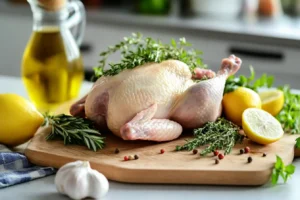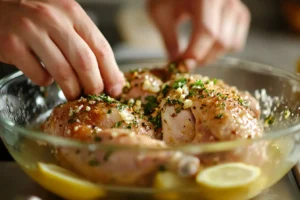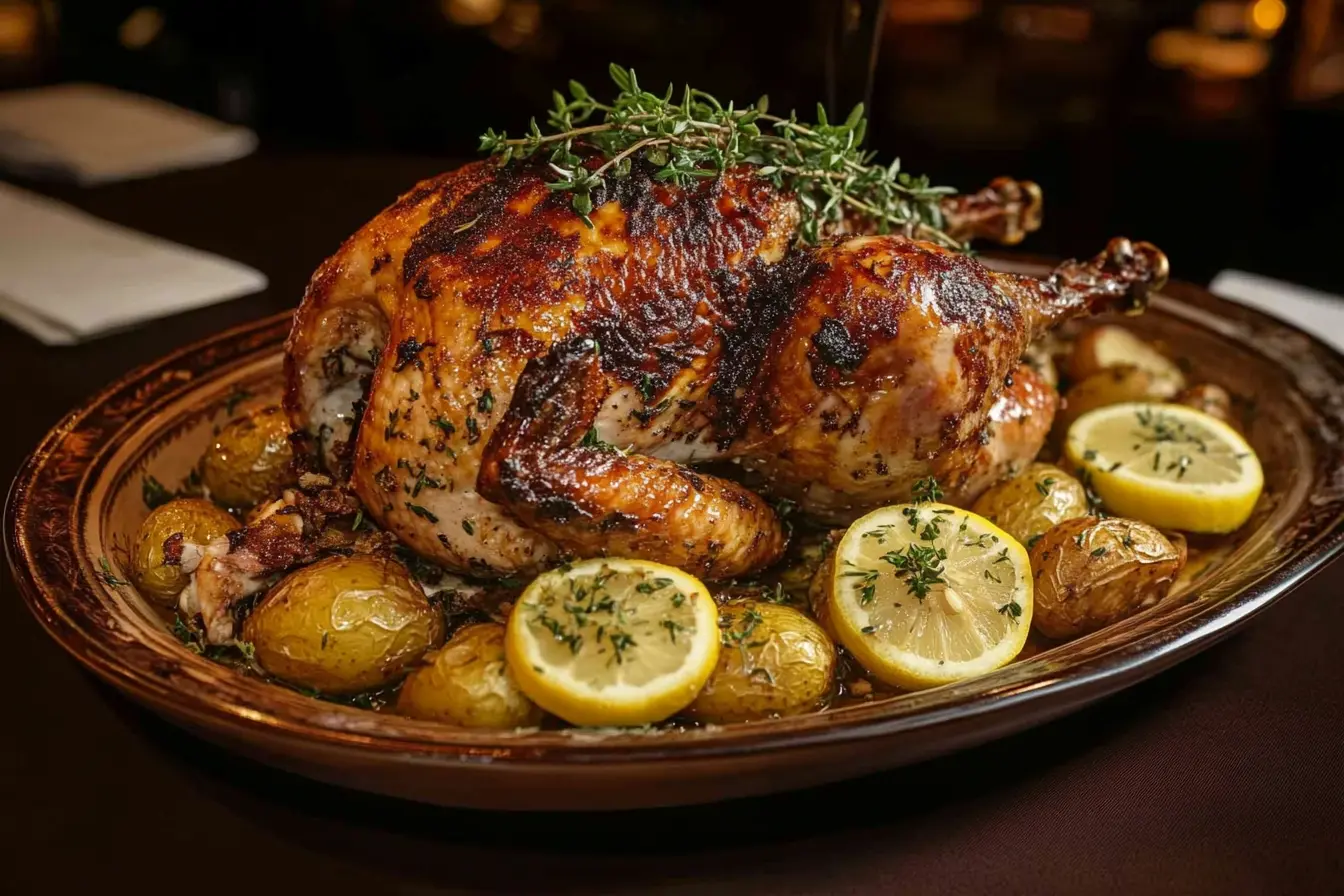Roasted chicken has long been a staple at dinner tables worldwide, and when paired with the tangy zing of lemon and the aromatic touch of fresh herbs, it becomes an absolute showstopper. This recipe combines tradition with simplicity, delivering a meal that’s not only easy to prepare but also deeply satisfying. Whether you’re hosting a family gathering or planning a quiet dinner, this lemon herb roasted chicken recipe will impress every time. Let’s dive into the details!
Introduction to Lemon Herb Roasted Chicken
What is Lemon Herb Roasted Chicken?
Lemon herb roasted chicken is a classic poultry dish where a whole chicken is infused with the bold flavors of lemon juice, fresh herbs like rosemary and thyme, and a hint of garlic. This delightful combination not only enhances the taste but also locks in moisture, resulting in tender, flavorful meat with crispy, golden skin.
Historical Background of Roasted Chicken Dishes
The tradition of roasting chicken dates back centuries and spans cultures. From medieval feasts to modern kitchens, roasted chicken symbolizes hearty, wholesome meals. Over time, regional flavors like citrus and herbs have been introduced, giving us beloved variations like this lemon herb roasted chicken.
Why Choose Lemon and Herbs for Roasting?
Lemon and herbs are a match made in culinary heaven! The acidity of lemon juice tenderizes the chicken, while the herbs impart earthy, aromatic undertones. Combined, they create a balanced flavor profile that appeals to every palate. Additionally, lemon’s natural brightness complements the savory richness of roasted chicken beautifully.
Adding herbs like thyme, rosemary, or parsley not only boosts flavor but also adds a touch of elegance, transforming a simple roast into a gourmet experience.
Ingredients and Equipment Needed
Essential Ingredients for Lemon Herb Roasted Chicken
 To create this lemon herb roasted chicken recipe, you’ll need a handful of fresh, flavorful ingredients. While the list might seem simple, each item plays a crucial role in delivering the rich, mouthwatering taste this dish is known for.
To create this lemon herb roasted chicken recipe, you’ll need a handful of fresh, flavorful ingredients. While the list might seem simple, each item plays a crucial role in delivering the rich, mouthwatering taste this dish is known for.
- Whole Chicken: Opt for a free-range chicken, about 4-5 pounds, for the best flavor and texture.
- Lemons: Fresh lemons are essential. You’ll use both the juice and zest for that signature tang.
- Herbs: Stick to fresh rosemary, thyme, and parsley for maximum aroma. These herbs work together to elevate the dish.
- Garlic: Minced garlic cloves bring a savory depth that balances the citrusy brightness.
- Olive Oil: A high-quality extra virgin olive oil ensures the chicken stays moist and enhances the crispiness of the skin.
- Salt and Pepper: These humble seasonings are critical for amplifying the natural flavors.
- Optional Vegetables: You can include carrots, onions, and potatoes as a bed for the chicken, infusing them with the drippings.
Every ingredient adds a unique layer to the final dish, making each bite satisfying.
Selecting the Best Chicken for Roasting
Choosing the right chicken is vital, and here’s why: a fresh, high-quality chicken not only tastes better but also absorbs marinades more effectively. Look for poultry that is labeled organic or free-range whenever possible, as these tend to be less processed and more flavorful. Additionally, ensure the chicken is plump, with firm skin that’s free from blemishes.
If you’re unsure, ask your local butcher for recommendations. They often have expert insights that can help you select the best bird for your roast.
Necessary Kitchen Tools and Equipment
While ingredients are important, having the right tools is equally essential. Using the appropriate equipment can make the entire process smoother and more enjoyable.
- Roasting Pan: A sturdy roasting pan with a rack allows even heat distribution and prevents the chicken from becoming soggy.
- Meat Thermometer: For perfectly cooked chicken, a meat thermometer is indispensable. It ensures your bird reaches the safe internal temperature of 165°F.
- Basting Brush: This tool helps you coat the chicken evenly with olive oil and drippings.
- Zester: A microplane or zester makes it easy to add fine lemon zest to the marinade.
- Sharp Knife and Cutting Board: Essential for chopping herbs and slicing lemons.
- Kitchen Twine: If you plan to truss the chicken, twine will hold everything neatly together during roasting.
Now that you’ve gathered your ingredients and tools, you’re all set to begin preparing this delightful dish.
Preparation Steps
Cleaning and Prepping the Chicken
The first step in creating your lemon herb roasted chicken recipe is preparing the chicken. While it might seem straightforward, proper preparation ensures that the flavors permeate every bite.
Begin by removing any giblets from the cavity of the chicken. Although these are often included, they can be set aside for other recipes if desired. Rinse the chicken under cold water, and then pat it completely dry using paper towels. This step is crucial because excess moisture on the skin can prevent it from crisping up during roasting.
Once the chicken is dry, trim any excess fat or skin around the cavity. While you don’t want to remove too much, taking away extra bits will help avoid a greasy texture.
Marinating with Lemon and Herbs
 Marinating the chicken is where the magic begins. This process infuses the meat with the vibrant flavors of lemon and fresh herbs, ensuring a flavorful result.
Marinating the chicken is where the magic begins. This process infuses the meat with the vibrant flavors of lemon and fresh herbs, ensuring a flavorful result.
Start by zesting one lemon and juicing two others. In a small bowl, mix the lemon juice and zest with minced garlic, finely chopped rosemary, thyme, parsley, and a generous drizzle of olive oil. Add salt and pepper to taste. Stir everything together to create a thick, aromatic marinade.
Rub the marinade generously all over the chicken, making sure to coat the skin, legs, and wings evenly. Don’t stop there! Carefully loosen the skin over the breast meat by sliding your fingers underneath, and spread some of the marinade directly onto the meat. This ensures that every bite is infused with flavor.
Place a few sprigs of herbs and lemon slices inside the cavity of the chicken. This not only adds fragrance but also helps steam the meat from the inside, keeping it juicy.
Preheating the Oven and Preparing the Roasting Pan
While the chicken marinates, preheat your oven to 425°F (218°C). Using the right temperature ensures the chicken roasts evenly, with a crispy exterior and tender interior.
Prepare the roasting pan by placing a rack inside to elevate the chicken. If you’re using vegetables, arrange them in the bottom of the pan, creating a bed that will soak up the flavorful drippings. Rest the marinated chicken breast-side up on the rack, ensuring it is centered for even cooking.
Finally, loosely cover the chicken with aluminum foil to prevent it from browning too quickly. Now, you’re ready to roast!
Cooking Instructions
Properly Trussing the Chicken
Trussing the chicken is a small but impactful step in this lemon herb roasted chicken recipe. While it might seem optional, tying the legs together ensures that the bird cooks evenly and retains its shape during roasting.
Using kitchen twine, start by tucking the wings underneath the body to prevent them from burning. Next, bring the legs together and tie them securely with the twine, making sure to keep the cavity sealed. This technique helps the chicken retain moisture, resulting in juicier meat.
Roasting Time and Temperature Guidelines
When it comes to roasting chicken, temperature and timing are everything. Preheat your oven to 425°F (218°C) to ensure the skin crisps up beautifully. Place the prepared chicken, breast-side up, in the center of the oven for even heat distribution.
The general rule of thumb is to roast the chicken for approximately 20 minutes per pound. A 4-pound bird, for instance, will need about 80 minutes. However, it’s vital to check the internal temperature with a meat thermometer to ensure accuracy. Insert the thermometer into the thickest part of the thigh, avoiding the bone. The chicken is fully cooked when the thermometer reads 165°F (74°C).
If the skin begins to brown too quickly, tent the chicken with foil during the last 20 minutes of roasting. This will prevent it from becoming overly dark while allowing the meat to cook through.
Basting Techniques for Juicy Meat
Basting is the key to keeping your chicken moist and flavorful. About 30 minutes into roasting, use a basting brush or a spoon to drizzle the drippings from the pan over the chicken. This process not only locks in moisture but also enhances the flavor profile with those delicious, herb-infused juices.
Repeat the basting process every 20 minutes to ensure consistent flavor and juiciness. However, avoid opening the oven too often, as this can lower the temperature and increase cooking time.
Once the chicken reaches the desired internal temperature, remove it from the oven and let it rest for 10-15 minutes. Resting is crucial because it allows the juices to redistribute throughout the meat, ensuring every bite is tender and moist.
Serving Suggestions
Carving the Roasted Chicken
Carving a perfectly roasted chicken can feel intimidating, but with a few tips, you’ll serve neat, delicious portions in no time. After resting the chicken for 10-15 minutes, transfer it to a cutting board. Using a sharp knife, start by removing the legs. Cut through the joint where the thigh meets the body, and repeat on the other side.
Next, slice off the wings by cutting at the joint. Then, carve the breast meat by slicing downward along one side of the breastbone. Repeat on the opposite side. Arrange the pieces neatly on a serving platter, ensuring each piece showcases the crispy, golden skin. Don’t forget to drizzle some of the pan drippings over the carved meat for added flavor.
Ideal Side Dishes to Accompany
This lemon herb roasted chicken recipe pairs beautifully with a variety of side dishes, offering endless possibilities to create a complete meal. Roasted vegetables, such as carrots, potatoes, and Brussels sprouts, are classic choices. Their caramelized edges and tender interiors make them the perfect complement to the juicy chicken.
For a lighter option, serve the chicken alongside a fresh salad with a tangy vinaigrette. Something as simple as mixed greens, cherry tomatoes, and cucumbers balances the richness of the roast. A side of fluffy rice or buttery mashed potatoes also works wonderfully, soaking up the herb-infused drippings.
If you’re serving this dish for a special occasion, consider adding freshly baked bread rolls or a loaf of crusty bread to round out the meal.
Creative Garnishes for Presentation
Presentation matters, and garnishing your roasted chicken adds that wow factor. Scatter fresh sprigs of rosemary and thyme over the platter for a vibrant pop of green. Add thin lemon slices around the chicken to reinforce the citrus theme and make the dish visually appealing.
If you’ve roasted vegetables in the pan, arrange them around the chicken to create a colorful and inviting display. A sprinkle of freshly chopped parsley over the top ties everything together and gives your dish a polished, restaurant-quality finish.
Nutritional Information and Considerations
Calorie and Macronutrient Breakdown
When enjoying this lemon herb roasted chicken recipe, you’ll be glad to know it strikes a balance between indulgence and nutrition. A serving of roasted chicken provides approximately 250-300 calories, depending on the portion size and whether the skin is included.
In terms of macronutrients, chicken is an excellent source of lean protein, with each serving offering about 25-30 grams. It contains minimal carbohydrates, making it suitable for low-carb diets, while the fat content varies depending on how much skin you consume. If you opt for skinless pieces, the fat content drops significantly.
Health Benefits of Ingredients Used
The ingredients in this recipe not only contribute to its flavor but also provide impressive health benefits. Lemon juice, for instance, is packed with vitamin C, which supports a healthy immune system and aids in digestion. Fresh herbs like rosemary and thyme are rich in antioxidants, helping to reduce inflammation and promote overall well-being.
Garlic, another star ingredient, contains allicin, a compound known for its antimicrobial and heart-healthy properties. Meanwhile, olive oil provides healthy monounsaturated fats, which are good for heart health when consumed in moderation. Together, these ingredients make this dish as nutritious as it is delicious.
Dietary Modifications and Alternatives
One of the best aspects of this recipe is its adaptability to various dietary needs. If you’re following a low-sodium diet, reduce the salt in the marinade and use herbs to enhance flavor instead. Those watching their fat intake can easily prepare the chicken without olive oil, opting for a light spray of cooking oil instead.
For individuals avoiding gluten, ensure any additional sides like stuffing or bread are gluten-free. Vegetarians or those looking for plant-based options can use the same lemon herb marinade on tofu or roasted vegetables for a flavorful twist.
This recipe caters to many dietary preferences, making it a versatile choice for family meals or gatherings.
Frequently Asked Questions (FAQs)
How can I ensure my chicken is fully cooked?
To guarantee your chicken is fully cooked, use a meat thermometer. Insert it into the thickest part of the thigh, making sure it doesn’t touch the bone. The chicken is safe to eat when the internal temperature reaches 165°F (74°C). Additionally, the juices should run clear when the meat is pierced, and the skin should appear golden and crispy.
Can I use dried herbs instead of fresh ones?
Absolutely! While fresh herbs provide a more vibrant flavor, dried herbs are a convenient alternative. Use about one-third of the amount called for fresh herbs, as dried herbs are more concentrated. For example, replace one tablespoon of fresh rosemary with one teaspoon of dried rosemary.
What should I do if I don’t have a roasting pan?
No roasting pan? No problem! You can use a large oven-safe skillet, a baking dish, or even a rimmed baking sheet. If possible, place a wire rack in the pan to elevate the chicken and allow air to circulate underneath, ensuring even cooking.
How do I prevent the chicken from drying out?
Keeping the chicken moist starts with marinating it thoroughly. During roasting, baste the chicken every 20 minutes with the drippings from the pan. Additionally, tent the chicken with aluminum foil if the skin begins to brown too quickly, as this prevents overcooking. Lastly, don’t forget to let the chicken rest for 10-15 minutes after removing it from the oven, allowing the juices to redistribute evenly.
Is it necessary to marinate the chicken overnight?
While marinating overnight enhances the flavor, it’s not essential. Even marinating for 30 minutes can make a noticeable difference. If you’re short on time, prepare the marinade first and let the chicken soak while you prep the oven and other ingredients.
Can I use this recipe for other poultry like turkey?
Yes, this recipe works wonderfully for other poultry like turkey or Cornish hens. However, you’ll need to adjust the cooking time based on the size of the bird. For instance, a larger turkey will require more time, and you’ll need to periodically check the internal temperature to ensure it’s cooked through.

